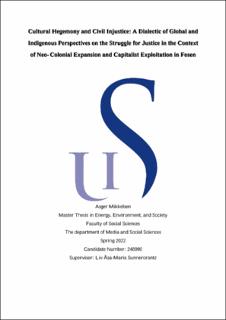| dc.description.abstract | ABSTRACT: This paper examines the implications of the wind energy expansion in the Fosen region on Indigenous communities, specifically the Sampi region, and the resulting human rights violations. Despite the acknowledgment of these violations, the energy companies, and the Norwegian government, represented by the olje og energidepartementet (OED) and Statkraft, have displayed a lack of substantial action over a span of 600 days to address or hold accountable those responsible for these transgressions. This situation underscores the conflict between the interests of the minority and the majority, emphasizing the need to prioritize the well-being of the Indigenous community. However, the state has yet to launch initiatives or compensatory measures to address the damages inflicted. Instead, the Indigenous peoples find themselves on the brink of assuming a significant role within the context of Norwegian and European green capitalism. The objective of this research is to investigate the complex relationship between Western democratic capitalism, neoliberalism, and Indigenous peoples, particularly in the context of climate change and ongoing efforts to decarbonize the energy and transportation sectors. Furthermore, this study explores the historical and contemporary instances of inaction, inertia, and a lack of willingness to effectively confront climate change and social inequality. By critically examining these dynamics, this paper aims to raise awareness about the inherent shortcomings of prevailing economic and political systems in safeguarding the rights of Indigenous peoples and effectively addressing the urgent challenges posed by climate change in our globally interconnected yet unequal world. The study also highlights the disparities in social outcomes experienced by already marginalized groups, both within national and transnational contexts, acknowledging and recognizing perspectives and grievances from those most exposed to social inequity and climate change outcomes. | |
